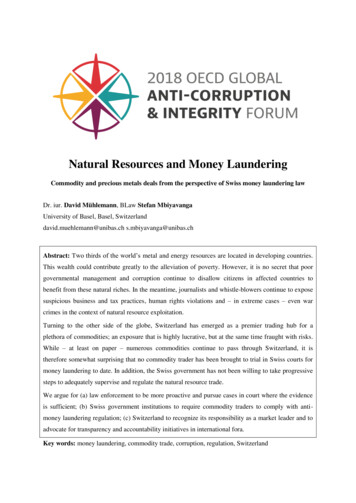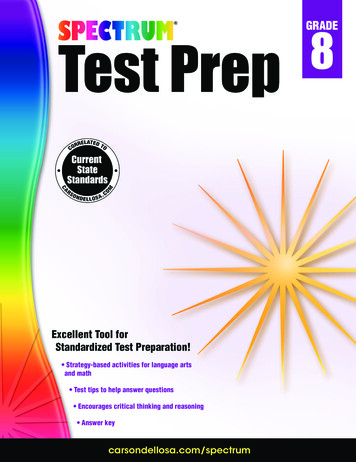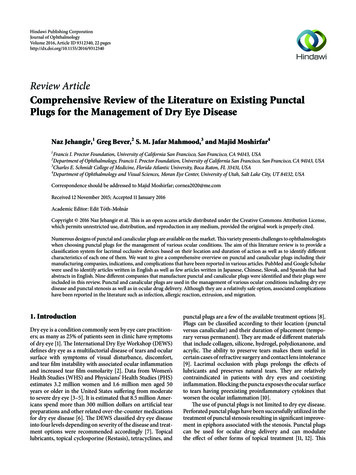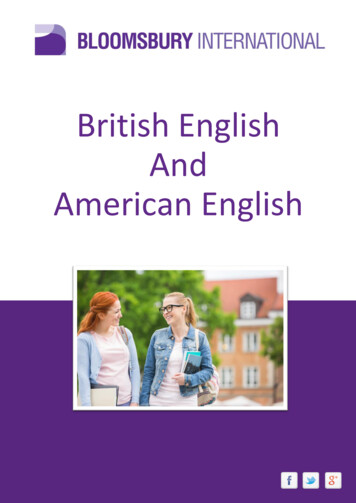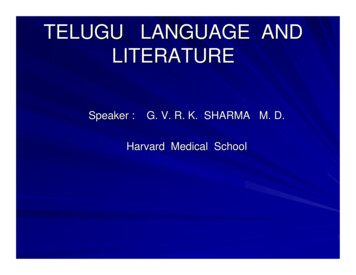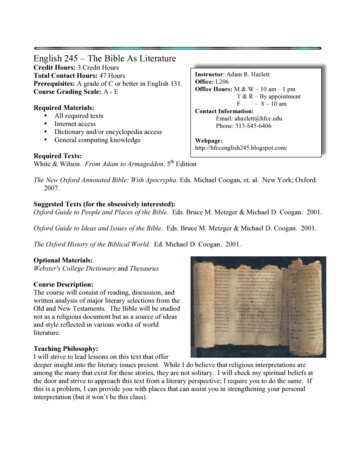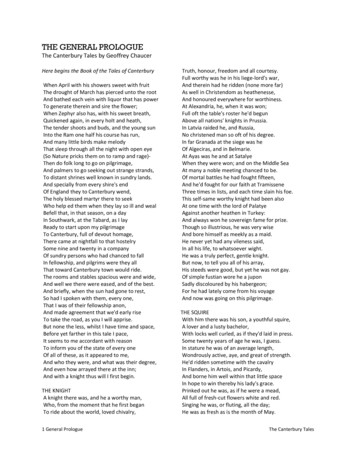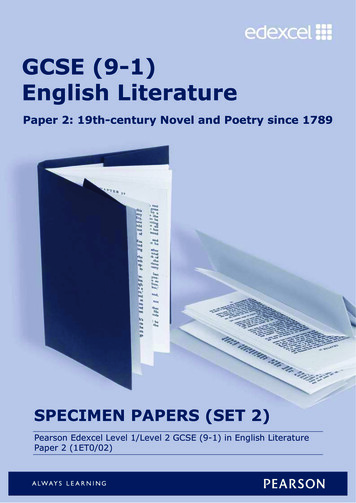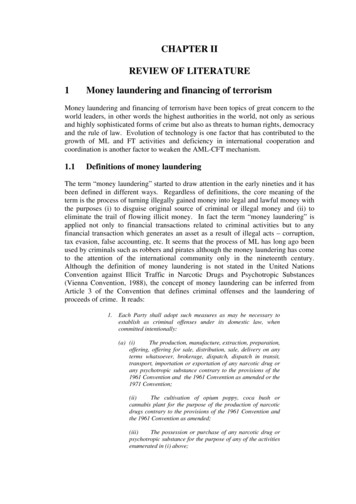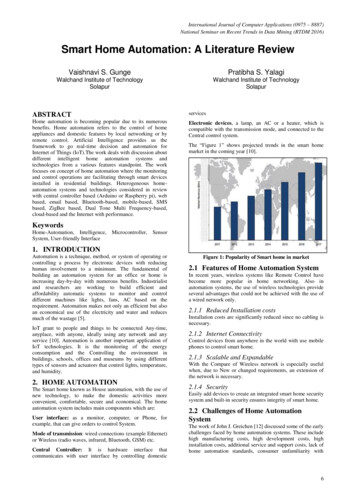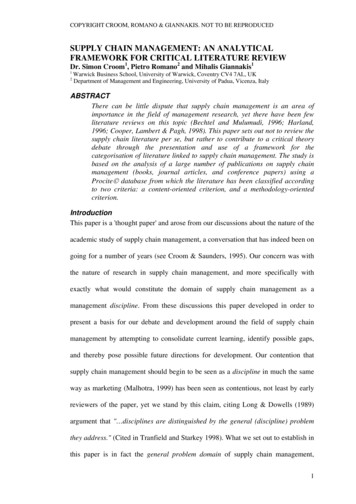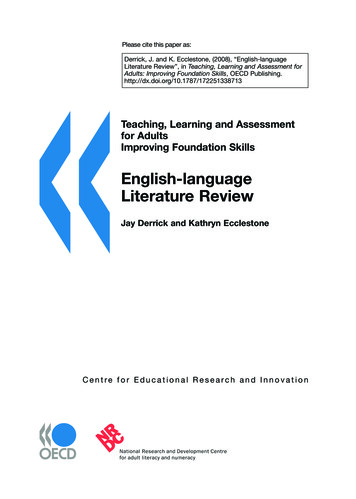
Transcription
Please cite this paper as:Derrick, J. and K. Ecclestone, (2008), “English-languageLiterature Review”, in Teaching, Learning and Assessment forAdults: Improving Foundation Skills, OECD eaching, Learning and Assessmentfor AdultsImproving Foundation SkillsEnglish-languageLiterature ReviewJay Derrick and Kathryn EcclestoneCentre for Educational Research and Innovation002008091new.indd 807-Feb-2008 5:17:29 PM
Please cite this paper as:Derrick, J. and K. Ecclestone (2008), “Englishlanguage Literature Review”, in Teaching, Learningand Assessment for Adults: Improving FoundationSkills, OECD EACHING, LEARNING AND ASSESSMENT FOR ADULTSIMPROVING FOUNDATION SKILLSEnglish-language Literature ReviewJay Derrick and Kathryn EcclestoneTEACHING, LEARNING AND ASSESSMENT FOR ADULTS: IMPROVING FOUNDATION SKILLS – ISBN-978-92-64-03990-2 OECD/NRDC 2008
ENGLISH-LANGUAGE LITERATURE REVIEW – 3Table of Contents1. Introduction . 52. The review‟s methodology and structure . 63. Defining formative assessment in adult learning . 9Competing meanings of learning . 9Formative activities . 124. Formative assessment and adult learning: discussion of themesemerging from the literature . 14Developing an atmosphere and culture conducive to learning . 15Dialogue between teacher and learners . 20Peer assessment and self-assessment . 32Learners‟ understanding of assessment and the language of assessment . 38Feedback and marking of work . 42Questioning and checking learning . 48Planning and differentiation . 51Improving motivation and confidence, autonomy, and citizenship. 53Using different types of assessment formatively. 59Practising assessment: learning for the future . 655. Conclusions and messages for teachers . 68Formative assessment and learners of adult literacy, numeracy and language . 68Messages for teachers. 69Future research . 76References . 76Appendix 1: Texts reviewed . 81Appendix 2: Analysis of review texts . 123TEACHING, LEARNING AND ASSESSMENT FOR ADULTS: IMPROVING FOUNDATION SKILLS – ISBN-978-92-64-03990-2 OECD/NRDC 2008
ENGLISH-LANGUAGE LITERATURE REVIEW – 51. Introduction(Note: where references are made to the material surveyed in theliterature review, they are printed in bold text. These references are given inappendix 1 of the review. Other references, printed in ordinary text, aregiven in the references section.)This review has been produced as a jointly-funded element of tworesearch projects. The first is „Improving Formative Assessment‟ (IFA), athree year study of formative assessment practices in post-compulsorylearning settings in the UK, which will be completed in December 2007.This study has been funded by the Nuffield Foundation and the NationalResearch and Development Centre for adult literacy and numeracy (NRDC).The second is the Organisation for Economic Co-operation andDevelopment‟s (OECD) study Teaching, Learning and Assessment forAdults: Improving Foundation Skills. This is a study of national policycontexts and formative assessment practices in relation to adult literacy,numeracy and language learning in seven countries. The OECD study alsocommissioned literature reviews in French, German, Spanish, and English:the last of these is the present paper.Much of the influential work in the UK on ideas about formativeassessment and assessment for learning has been developed either in thecompulsory sector in the context of a highly prescriptive summative testingsystem at five stages of children‟s schooling (Black and Wiliam, 1998;Black et al., 2005), or in relation to higher education (see for example Gibbsand Simpson, 2003, Brookhart, 2001, Crooks, 1988). While the theoreticaland empirical work has generated a sound evidence base for identifyinggeneric techniques and activities that teachers can use with students, therehas not yet been an attempt to either a) relate these ideas to their potentialuse with adult learners in contexts for learning that are very different fromschools and universities; or b) review the literature that might illuminatehow formative assessment works with adults in the learning and skills sectorand in informal learning situations.It is especially important to establish a clear understanding based onsound theories and practices of formative assessment in the context ofEngland and Wales, where the learning and skills sector (which includesadult education) has strong implicit theories of learning embedded in itssystems for funding, quality assurance and performance measurement. Thebasic measurement tool for all these systems is the counting of qualificationoutcomes, which through benchmarking and comparison at all levels in thesystem, puts pressure directly onto teachers to adapt their teaching to thenarrow requirements of the system rather than the needs of learners. The useTEACHING, LEARNING AND ASSESSMENT FOR ADULTS: IMPROVING FOUNDATION SKILLS – ISBN-978-92-64-03990-2 OECD/NRDC 2008
6 – ENGLISH-LANGUAGE LITERATURE REVIEWof summative outcomes for accountability thus directly affects ideas andpractices in relation to formative assessment (see Derrick et al., in press;Ecclestone et al., in progress).The gap in research on formative assessment for adult learning andgrowing evidence about the impact of strongly target-driven summativesystems make it important to differentiate between activities that look likeformative assessment but which may be little more than coaching orcontinuous summative assessment, and to examine the political, social andcultural factors that affect how teachers and students practise formativeassessment in different learning and assessment contexts (Ecclestone, 2002,2004, Torrance et al., 2005, Ecclestone et al., in progress). We hope that thisliterature review will make a contribution to the illumination of theseimportant issues, and ultimately make a positive material difference to thework of teachers and learners in adult education services.2. The review‟s methodology and structureThe material surveyed directly in this review was gathered and selectedbetween June 2005 and February 2007, through a combination of means,including Internet searches on key words, suggestions from colleagues,bibliographical trails, and personal knowledge and experience. We startedwith a number of overview studies of adult learning, including Edwards etal. (1998), Cullen et al. (2002), and in particular found Tusting and Barton(2003) and Zachry and Comings (2006) very useful. But finding relevantmaterial has not been a systematic process, because attempts to searchsystematically for material on formative assessment and adult learningproduced few results, except in relation to teaching and learning in highereducation. These we decided to exclude in order to ensure this review had itsmain focus clearly in the learning and skills sector, (that is, in adult learningin post-compulsory education not provided in universities and inworkplaces), in informal adult learning, and in adult basic education; wehope however, that this review will complement other research focusingdirectly on higher education. Of course, the fact that relevant material wasnot found through systematic searches does not mean that „formativeassessment‟ is a topic which is irrelevant to, or which has been ignored bywriters on adult learning, but that the term „formative assessment‟ has onlyrarely been used until recently in the context of adult or lifelong learning.It appears in a UNESCO report as early as 1978, which, in examiningconceptual approaches to the evaluation of schooling and assessing theirrelevance for lifelong learning, argues that:TEACHING, LEARNING AND ASSESSMENT FOR ADULTS: IMPROVING FOUNDATION SKILLS – ISBN-978-92-64-03990-2 OECD/NRDC 2008
ENGLISH-LANGUAGE LITERATURE REVIEW – 7„There should be a much greater emphasis on formative assessmentthan is found in the school sector‟ (Skager, 1978).Apart from this isolated recommendation, the earliest explicit referencefound to formative assessment in relation to lifelong or adult learning was inBoud (2000), though relevant work published since then is much morelikely to use the term. We have found only one book-length treatment ofpost-compulsory learning that uses the term „formative assessment‟ in itstitle (Ecclestone, 2002), and this is based on a study of two groups of16-19 year-old vocational students in a qualification where goals offormative assessment for autonomy and motivation were built into a radical,controversial assessment model. Only one short published paper on adulteducation uses „formative assessment‟ in its title (Swain et al., 2006).However, many other studies focussing on a wide range of settings for adultlearning deal with topics and concepts clearly related to formativeassessment, though mostly not explicitly and almost never systematically.For example, many publications discuss „feedback‟ as an importantcomponent of adult learning but few link this to the notion of formativeassessment.The term „formative assessment‟ is not clearly defined and has not beencurrent in the literature on adult learning until recently. However, otherrelevant terms and concepts have been widely studied as being central toeffective adult learning. A relatively unsystematic approach is supported byBlack and Wiliam (2003) who acknowledge the complexity of researchreviews in social science and the difficulties of producing „objectivesyntheses‟ of research findings, and the dangers of the accidental butsystematic exclusion of relevant material, particularly in fields which areunder-theorised and not well-defined. In particular, in the relative absence ofsystematic academic studies, this review has sought to access „practitionerwisdom‟ wherever possible, and agrees with the definition of „evidencebased practice‟ given by NCSALL in the USA as „the integration ofprofessional wisdom with the best available empirical evidence in makingdecisions about how to deliver instruction‟ (Comings, 2003). We thereforehope that our review contributes to the eventual development of a systematicconceptual framework for theorising formative assessment in adult learning.However, we are well aware that we have probably missed relevantmaterial, particularly from English-speaking countries other than the UK,and that relevant new publications and reports are appearing with increasingrapidity.We have organised discussion of the review material under relevantthemes in discussions of formative assessment, even though these are notalways wholly distinct headings and different terminology is apparentlyused for similar aspects of teaching and learning. A short summary of theTEACHING, LEARNING AND ASSESSMENT FOR ADULTS: IMPROVING FOUNDATION SKILLS – ISBN-978-92-64-03990-2 OECD/NRDC 2008
8 – ENGLISH-LANGUAGE LITERATURE REVIEWmain points arising from the discussion of the literature under each theme isgiven at the end of the relevant section.It is important to stress that evidence discussed here does not firmlyestablish strong links between specific teaching approaches and improvedachievement, though it may help in the design of future investigationsaiming to explore this question. Indeed, some studies demonstrate thedifficulty of isolating the clear effects of a single approach or technique in asystem in which policy and assessment design, mechanisms to regulate andmoderate teachers‟ assessment, and their impact on institutional providersand groups of learners are complex and intractably entangled (see forexample Ecclestone, 2002).While there have been no large-scale systematic studies of adult learningaiming to identify such links, the Improving Formative Assessment projectis revealing the importance of understanding the links between policy,teachers‟ and students‟ beliefs about learning and the effects of assessmentpractices in adult literacy and numeracy programmes (see Ecclestone et al.,in progress).The review is therefore mainly descriptive and makes only cautiousgeneralisations about effective practice. Nevertheless it highlightsprovisional messages about effective practice and suggests future researchquestions.The 99 articles, papers, and chapters surveyed in this literature revieware listed with abstracts or summaries at the end of the review. They aregrouped into the
achievement, though it may help in the design of future investigations aiming to explore this question. Indeed, some studies demonstrate the difficulty of isolating the clear effects of a single approach or technique in a system in which policy and assessment design, mechanisms to regulate and
